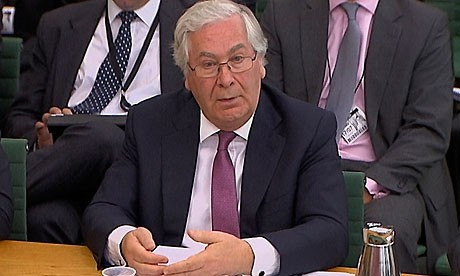Goldman Sachs' Bankers Bonus Tax Dodge 'Depressing' - BoE's Mervyn King

Goldman Sachs bankers delaying their bonus payments to avoid higher income tax rates have been condemned by Bank of England Governor Sir Mervyn King.
King lashed out at the unconfirmed plans by Goldman in an appearance at the House of Commons Treasury Select Committee alongside other senior BoE staff.
"I find it a bit depressing that people who earn so much find it would be even more exciting to adjust their payouts to benefit from the tax rate, knowing that this must have an impact of the rest of society, which is suffering most from the consequences of the financial crisis," King told MPs at the hearing.
"I think it would be a rather clumsy and lacking in care and attention to how other people might react, and in the long run financial institutions do depend on goodwill from society."
In his last Budget, Chancellor George Osborne slashed the top rate of income tax to 45 percent on the basis that it would generate more revenue and that the current 50 percent rate was unfair and generated little additional benefit for the Treasury.
FPC's new regulatory role
At the hearing, King admitted to MPs that the new regulatory regime for the financial industry is "a bit of an experiment".
He and others from the BoE's Financial Policy Committee, which will take charge of banking regulation in reforms currently working through parliament, told the Treasury Select Committee that despite the unknown efficacy of the new system, it is "worth a try".
The TSC session scrutinised a draft policy document released by the BoE which detailed how it would use the new powers the FPC will soon hold, subject to likely approval of the legislation by lawmakers.
FPC members will rely on a number of indicators, such as the deposit requirement on residential mortgages, to monitor the state of the economy and, along with their judgment, decide when to deploy capital requirement tools to tighten up the protective buffers if warning signs suggest a credit bubble is building.
The governor, who will leave his post in July and be replaced by current Bank of Canada head honcho Mark Carney, was asked why credit rating agencies were not listed as one of the indicators.
"We're not confident that the ratings are ones which we would want to trust," he said.
Ratings agencies are seen as discredited by many, who point to their AAA-rubber stamping of the toxic sub-prime mortgage-backed securities that triggered the global financial crisis.
One of the new FPC powers will be the sectoral capital requirement (SCR), which gives the BoE freedom to change buffer rules for specific sub-sectors, such as residential property, as and when it sees fit.
This should give the BoE flexibility to adapt its rules quickly and stave off any meltdown by forcing banks to better protect themselves against specific exposures, assuming it heeds warning signs fast enough.
Another power will be countercyclical capital buffer (CCB), which sees regulators raise their capital requirements when credit grows more quickly than GDP, halting a bubble before it bursts.
John Mann, a Labour MP who sits on the TSC, questioned the diversity of the FPC and asked if there should be representatives from smaller local or regional financial institutions as members.
Andy Haldane, executive director of financial stability at the BoE, said that there were disagreements and debates at FPC meetings because of the diversity of view, but rejected the idea of allowing members of the banking community to sit on the committee.
"I would be cautious of drawing those who the powers are subject into decision making," Haldane said, adding that it would "fly in the face" of the independence of regulators.
© Copyright IBTimes 2025. All rights reserved.






















